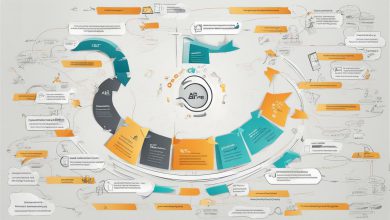
When it comes to technology architecture, there are three roles that are crucial to any organization’s success: Enterprise Architect, Solutions Architect, and Software Architect. While these terms are often used interchangeably, they actually refer to distinct positions with unique responsibilities and skill sets.
In this article, we’ll explore the key differences between these three roles, as well as the skills required for success in each one. By the end of this article, readers will have a better understanding of the important distinctions between Enterprise Architects, Solutions Architects, and Software Architects, and be better equipped to choose the right architect for their organization’s needs.
Key Takeaways:
- Enterprise Architect, Solutions Architect, and Software Architect are three distinct roles in technology architecture.
- Each role has unique responsibilities and required skill sets.
- Understanding the differences between these roles is essential for effective technology architecture.
Role of an Enterprise Architect
Enterprise Architects (EAs) play a critical role in ensuring that businesses function optimally. They are responsible for facilitating communication and collaboration between all departments, ensuring that systems and processes are in alignment with the company’s goals and objectives. EAs must have exceptional technical skills, deep knowledge of business operations, as well as managerial and leadership capabilities.
The primary role of an EA is to develop and execute a comprehensive strategy that aligns an organization’s technology infrastructure with its overall objectives. They are in charge of designing and overseeing the implementation of solutions that meet the needs of their organization. They must balance the need for innovation with the need for security and compliance, ensuring that their organization’s systems meet a range of regulatory requirements.
One of the most important skills an EA must possess is the ability to communicate complex technical concepts to non-technical stakeholders. They must be able to explain the reasoning behind their strategies and proposals in a way that is understandable to executives and other stakeholders. EAs must also be skilled in project management, as they are required to manage projects from conception to implementation.
Other critical skills for EAs include strategic thinking, exceptional problem-solving ability, a deep understanding of technology trends, and the ability to analyze complex data. Successful EAs must also have strong interpersonal skills, as they are required to work with individuals from a range of departments and backgrounds.
Role of an Enterprise Architect in Summary
- Develop and execute comprehensive strategies that align technology with business objectives.
- Balancing the need for innovation, security, and compliance.
- Communicate complex technical concepts to non-technical stakeholders.
- Skilled in project management to manage projects from conception to implementation.
- Exceptional problem-solving ability and strategic thinking.
- Deep understanding of technology trends and the ability to analyze complex data.
- Strong interpersonal skills to work with individuals from a range of departments and backgrounds.
Role of a Solutions Architect
As businesses grow, organizational needs become more complex, requiring strategic planning and implementation to ensure long-term success. This is where a Solutions Architect comes in.
A Solutions Architect is responsible for developing and managing the overall technical solutions for an organization. They work closely with key stakeholders, such as project managers, software developers, and system administrators, to design and implement innovative solutions that meet the company’s goals.
The role of a Solutions Architect is diverse and complex, requiring a broad range of skills and knowledge. They must have an excellent understanding of the business’s needs and objectives, as well as the current technology landscape. They must also be able to communicate effectively with both technical and non-technical stakeholders, translating complex technical concepts into easily understandable language.
| Skills Required for a Solutions Architect | Description |
|---|---|
| Business Acumen | Having an understanding of the wider business context, and how the technical solutions being proposed can support the company’s goals. |
| Technical Expertise | A deep understanding of current and emerging technologies and how they can be applied to solve business problems. |
| Communication Skills | The ability to communicate technical information to non-technical stakeholders in a clear and concise manner. |
| Leadership and Teamwork | The ability to lead and collaborate effectively with project teams, encouraging innovation and creativity. |
| Problem Solving | The ability to analyze complex problems and identify innovative, practical solutions that meet the business’s needs. |
A Solutions Architect must be able to balance the company’s short-term and long-term goals, selecting solutions that not only meet immediate needs but also provide a solid foundation for future growth. They must also be able to manage multiple projects simultaneously, prioritizing tasks and ensuring that everything is delivered on time and to a high standard.
Conclusion
As businesses continue to rely on technology to drive their success, the role of a Solutions Architect is becoming increasingly important. They are responsible for translating complex business needs into actionable solutions that will support the company’s growth and development. With a combination of technical expertise, communication skills, and business acumen, a Solutions Architect is an essential member of any organization seeking to stay ahead of the curve.
Role of a Software Architect
A Software Architect is responsible for designing and developing software applications that meet the needs of clients or users. They work closely with a team of developers, testing and quality assurance analysts, and project managers to ensure the software meets the desired specifications and is delivered within the given timeline.
The role of a Software Architect varies depending on the organization they work for and the type of software they are working on. However, there are some common responsibilities that are typically associated with this role:
- Developing software solutions: A Software Architect must have experience in developing software applications and the ability to design and implement solutions that meet the needs of clients or users.
- Understanding business requirements: They should be able to understand the business requirements and translate them into technical requirements that can be implemented by the development team.
- Designing software architecture: They must have knowledge of software design patterns, application architecture, and development methodologies to design and develop scalable, reliable, and robust software applications.
- Collaborating with development teams: They work closely with the development teams to ensure that the software applications are built according to the desired specifications and are delivered within the given timeline.
- Creating technical documentation: They are responsible for creating technical documentation that is easy to understand for developers and other stakeholders.
Skills required for a Software Architect:
- Excellent coding skills: They should have strong programming skills in languages such as Java, C++, Python, or Ruby.
- Knowledge of software design patterns: They must have experience in software design patterns such as MVC, MVP, and MVVM.
- Expertise in application architecture: They should be knowledgeable in creating scalable, distributed, and reliable software architectures.
- Leadership skills: They must have leadership qualities and should be able to lead a team of developers to deliver software applications.
- Excellent communication skills: They should be able to communicate effectively with the project stakeholders to understand the business requirements and translate them into technical requirements.
Difference between Enterprise Architect and Solutions Architect
While Enterprise Architects and Solutions Architects share some similarities in their responsibilities, they also differ in several ways. Here are some of the main distinctions:
| Enterprise Architect | Solutions Architect |
|---|---|
| Scope: Develops and implements the overall technology strategy for the organization. | Scope: Focuses on specific projects or initiatives within the organization. |
| Responsibilities: Identifies and plans for long-term technology needs of the business, works closely with stakeholders to align technology with business goals, and ensures that all technology solutions are sustainable and scalable. | Responsibilities: Designs and implements technology solutions for a specific project or business challenge, collaborates with project management to ensure that the solution meets the project requirements. |
| Skills: Broad understanding of all aspects of technology, strong leadership and communication skills, ability to balance long-term and short-term goals, business acumen. | Skills: Technical expertise in specific solutions or technologies, ability to collaborate with cross-functional teams, understanding of project management principles. |
By understanding these differences, organizations can determine which role is best suited for their technology needs and ensure that they have the right talent to drive their technology strategy forward.
Difference between Enterprise Architect and Software Architect
While an Enterprise Architect is responsible for designing an organization’s entire technology infrastructure, a Software Architect focuses on the design and development of software applications. There are several other key differences between these two roles that are worth exploring.
Scope of Work
The scope of work for an Enterprise Architect typically spans across the entire organization. They assess an organization’s current technology infrastructure, identify gaps and areas for improvement, and create a roadmap for future technological advancements. A Software Architect’s scope of work is limited to the development and design of software applications and systems.
Skills Required
Enterprise Architects need to have a broad range of skills to oversee the entire technology infrastructure of an organization. They require skills in project management, strategic planning, and critical thinking. On the other hand, Software Architects need to have expertise in programming languages, database management, and software development principles.
Responsibilities
Enterprise Architects are responsible for the overall technology strategy of an organization. They need to ensure that the technology used in the organization is in-line with the company’s objectives. In contrast, Software Architects are responsible for the technical design of software applications and ensuring that the applications meet the organization’s requirements.
Understanding the differences between Enterprise Architect and Software Architect is important for organizations in deciding which role is necessary for different projects or initiatives.
Difference between Solutions Architect and Software Architect
While Enterprise Architects are responsible for the overall structure of an organization’s technical and business strategy, Solutions and Software Architects’ responsibilities are more specialized. Solutions Architects (SAs) focus on ensuring that a company’s technology solutions align with its business objectives. In contrast, Software Architects (SfAs) design the software systems that enable a company to execute on its technology vision.
The primary difference between SAs and SfAs is the level of detail to which they design. SAs focus on high-level design and strategy, determining which technology solutions align with a company’s strategic goals. SfAs, on the other hand, design detailed software systems that execute on SAs’ strategic vision.
Another significant difference between an SA and an SfA is the scope of their responsibilities. SAs are responsible for ensuring that their company’s technology solutions align with its overall business objectives. They work closely with stakeholders from across the organization to identify business requirements and then develop and implement technology solutions that meet those needs. SfAs are responsible for designing and building software systems that allow their company to execute on its technological vision. They work closely with development teams to ensure that the software systems they design are functional, reliable, and scalable.
To summarize, while Solutions Architects are focused on aligning technology solutions with business goals, Software Architects focus on designing and building the software the organization uses to execute on those goals.
Skills Required for an Enterprise Architect
An Enterprise Architect is responsible for overseeing an organization’s overall strategy and ensuring that all IT systems align with this strategy. The role requires a combination of technical expertise and business acumen. Here are some of the essential skills an Enterprise Architect should possess:
| Skills | Description |
|---|---|
| Leadership | An Enterprise Architect should have strong leadership skills to work collaboratively with other stakeholders, including management, IT teams, and business units. |
| Communication | The ability to communicate effectively across various departments, translating technical language into layman’s terms and vice versa, is critical. An Enterprise Architect should also be able to convey complex ideas and strategies in a clear and concise manner. |
| Technical Knowledge | An Enterprise Architect needs a deep understanding of various IT systems, tools, and technologies. They should have knowledge of data analytics, software development, cloud computing, cybersecurity, and enterprise applications. |
| Business Acumen | An Enterprise Architect should have a good understanding of business processes, models, and frameworks. They should also be familiar with regulatory compliance and industry standards. |
| Problem Solving | An Enterprise Architect should be a critical thinker with excellent problem-solving skills. They should have the ability to analyze complex data and situations to develop effective solutions. |
| Adaptability | An Enterprise Architect should be adaptable and able to keep up with the latest industry trends and technologies. They should also know how to pivot when necessary. |
Having these skills can help ensure success in the role of an Enterprise Architect. However, in addition to these skills, an Enterprise Architect should have a strong work ethic and be willing to continuously learn and improve.
Skills Required for a Solutions Architect
A Solutions Architect is responsible for designing and implementing complex systems that meet both the functional and non-functional requirements of an organization. To excel in this role, a Solutions Architect must possess a unique set of skills that enable them to deliver practical and efficient solutions to complex problems. Below are the key skills required for a Solutions Architect:
- Strong communication skills: As a Solutions Architect, you’ll need to communicate effectively with both technical and non-technical stakeholders. You should be able to explain technical concepts in a way that is easy for non-technical stakeholders to understand.
- Extensive technical knowledge: Solutions Architects must have in-depth knowledge of a broad range of technologies and tools, including cloud computing, database management, and security protocols. They should be able to leverage this expertise to design and implement optimal solutions.
- Problem-solving skills: A Solutions Architect must be an expert problem solver. They should be able to diagnose and resolve issues quickly and effectively, using a combination of logical thinking and creative problem solving techniques.
- Leadership skills: A Solutions Architect should be equipped with the necessary leadership skills to define and communicate a vision, motivate and inspire a team, and manage project timelines and budgets.
- Business acumen: A Solutions Architect should have a solid understanding of the business goals and objectives of their organization. This allows them to design and implement solutions that align with the overall strategy of the business.
These skills are essential for any Solutions Architect looking to excel in their role. By developing and honing these competencies, you’ll be better equipped to design and implement solutions that drive business outcomes and deliver significant value to your organization.
Skills Required for a Software Architect
A Software Architect is responsible for designing and maintaining an organization’s software infrastructure. They need a unique set of skills that enable them to develop efficient and reliable software systems for businesses.
Here are some of the critical skills required for a Software Architect:
- Technical Knowledge: Software Architects serve as the technical advisors for organizations. They need to have in-depth knowledge of the latest programming languages, software development methodologies, and other technical aspects related to software development.
- Strong Analytical Skills: Software Architects need to be analytical and problem solvers. They should have the ability to identify and analyze complex technical problems and provide efficient solutions that align with business goals.
- Excellent Communication Skills: Software Architects must communicate effectively with other software developers and non-technical stakeholders. They need to be able to explain technical concepts to non-technical team members in a way that they can understand.
- Leadership Skills: A Software Architect should have excellent leadership skills. They need to be able to lead a team of developers and ensure that they are working towards a common goal.
- Attention to Detail: Software Architects must have excellent attention to detail. They need to ensure that all the software components work together seamlessly to deliver the desired functionality.
- Flexibility: Software Architects must be adaptable and able to work in a fast-paced environment. They should also be willing to learn new technologies and tools to ensure that they are up-to-date with industry developments.
Software Architects play an essential role in the success of an organization. They are responsible for creating and maintaining the software infrastructure that supports business operations. Therefore, it is crucial for them to possess the skills mentioned above to excel in their role.
Summary
Understanding the differences between Enterprise Architect, Solutions Architect, and Software Architect is important for anyone working in the tech industry. Each role requires its own unique set of skills and responsibilities. Enterprise Architects need to have a broad understanding of the business landscape, Solutions Architects must be able to solve complex problems, and Software Architects must be able to design and develop effective software solutions.
Continue Learning about Enterprise, Solutions, and Software Architects
If you want to learn more about these roles, check out the following resources:
- Enterprise Architecture for Dummies by Kalen Delaney
- The Art of Solution Architecture: A Handbook for Aspiring Architects by Eran Kampf
- Software Architecture in Practice by Len Bass, Paul Clements, and Rick Kazman
Recommendations for Further Reading
To learn more about the role of an Enterprise Architect, we recommend reading “Enterprise Architecture as Strategy” by Jeanne W. Ross, Peter Weill, and David C. Robertson. This book provides a comprehensive overview of how Enterprise Architecture can help businesses align their technology and strategic goals.
If you’re interested in becoming a Solutions Architect, “The Art of Scalability” by Martin L. Abbott and Michael T. Fisher is a must-read. This book offers practical advice on designing and implementing scalable systems, a key responsibility of Solutions Architects.
“Software Architecture in Practice” by Len Bass, Paul Clements, and Rick Kazman is an excellent resource for anyone looking to learn more about the role of a Software Architect. This book provides a thorough introduction to the field of software architecture, including methodologies and best practices.
Additional Resources
For further reading on Enterprise Architecture, be sure to check out “The Open Group Architecture Framework (TOGAF)” and “Zachman Framework for Enterprise Architecture.” Both frameworks offer valuable insights into the practice of Enterprise Architecture.
Those interested in Solutions Architecture should consider reading “AWS Certified Solutions Architect Official Study Guide” by Joe Baron, Hisham Baz, and Tim Bixler. This book provides an in-depth look at the skills and knowledge required to work with Amazon Web Services.
“Building Evolutionary Architectures” by Neal Ford, Rebecca Parsons, and Patrick Kua is a great resource for Software Architects looking to stay up-to-date with emerging trends and best practices in the field. The book offers practical advice on designing systems that can evolve over time.
FAQ
Q: What is the difference between an Enterprise Architect, Solutions Architect, and Software Architect?
A: An Enterprise Architect focuses on designing and optimizing the overall structure and strategy of an organization’s IT systems. A Solutions Architect, on the other hand, focuses on designing and implementing specific IT solutions to address business needs. A Software Architect primarily focuses on the design and architecture of software applications.
Q: What are the main responsibilities of an Enterprise Architect?
A: An Enterprise Architect is responsible for aligning business goals with IT systems, creating technology roadmaps, ensuring interoperability between different systems, and optimizing the overall IT infrastructure of an organization.
Q: What skills are required for an Enterprise Architect?
A: An Enterprise Architect should possess strong analytical and strategic thinking skills, excellent communication and leadership abilities, and solid technical knowledge across a wide range of IT domains.
Q: What does a Solutions Architect do?
A: A Solutions Architect is responsible for designing and implementing specific IT solutions, understanding business requirements, evaluating technology options, and ensuring that the solution meets the needs of the organization.
Q: What skills are required for a Solutions Architect?
A: A Solutions Architect should have a deep understanding of various technologies, strong problem-solving skills, excellent communication and negotiation abilities, and the ability to work collaboratively with both technical and non-technical stakeholders.
Q: What is the role of a Software Architect?
A: A Software Architect is responsible for designing the architecture of software applications, defining design patterns, ensuring scalability and performance, and providing technical guidance to development teams.
Q: What skills are required for a Software Architect?
A: A Software Architect should have a strong understanding of software development principles, expertise in relevant programming languages and frameworks, excellent problem-solving abilities, and the ability to translate business requirements into technical solutions.
Q: What are the differences between an Enterprise Architect and a Solutions Architect?
A: The main distinction is that an Enterprise Architect focuses on the overall IT strategy and infrastructure of an organization, while a Solutions Architect focuses on designing specific solutions to address business needs.
Q: What are the differences between an Enterprise Architect and a Software Architect?
A: An Enterprise Architect has a broader scope and focuses on the overall IT strategy, while a Software Architect focuses specifically on the design and architecture of software applications.
Q: How does a Solutions Architect differ from a Software Architect?
A: While both roles involve designing IT solutions, a Solutions Architect focuses on designing solutions to address business needs, while a Software Architect primarily focuses on designing the architecture of software applications.
Q: What skills are required for an Enterprise Architect?
A: An Enterprise Architect should possess strong analytical and strategic thinking skills, excellent communication and leadership abilities, and solid technical knowledge across a wide range of IT domains.
Q: What skills are required for a Solutions Architect?
A: A Solutions Architect should have a deep understanding of various technologies, strong problem-solving skills, excellent communication and negotiation abilities, and the ability to work collaboratively with both technical and non-technical stakeholders.
Q: What skills are required for a Software Architect?
A: A Software Architect should have a strong understanding of software development principles, expertise in relevant programming languages and frameworks, excellent problem-solving abilities, and the ability to translate business requirements into technical solutions.








